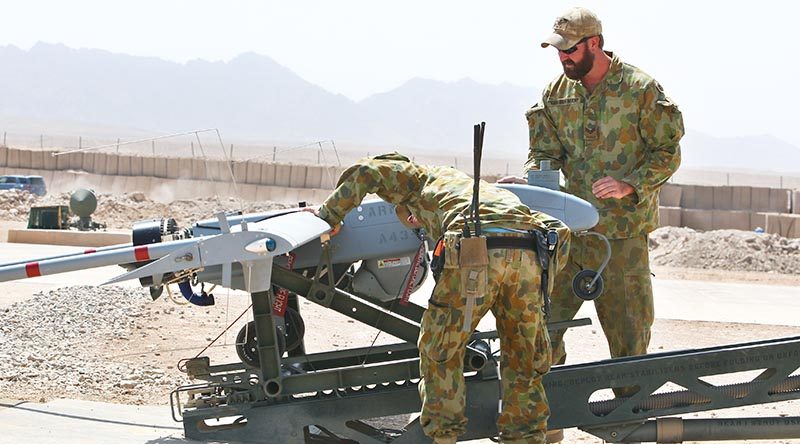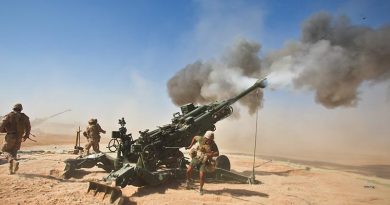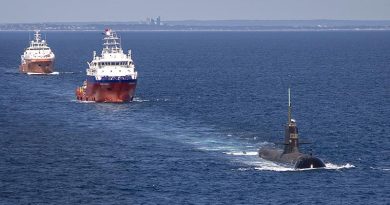Government ‘War Powers’ Inquiry hands down report
Share the post "Government ‘War Powers’ Inquiry hands down report"

The Defence Subcommittee of the Joint Standing Committee on Foreign Affairs, Defence and Trade has completed its examination on how Australia makes decisions to send service personnel into international armed conflict.
FILE PHOTO: Australian soldiers prepare a Shadow 200 UAV for a mission at Tarin Kot, Afghanistan, September 2012. Photo by Brian Hartigan.
Defence Subcommittee Chair, Mr Julian Hill MP, said “The power to declare war and send military personnel into conflict is arguably the most significant and serious institutional power, and the gravest decision a government can make.
“Through this inquiry, the Committee has carefully and seriously considered fundamental questions regarding decision-making in relation to international armed conflict and parliamentary oversight, both preceding and during the commitment of the Australian Defence Force.
“The Committee has concluded there is a clear need to improve the transparency and accountability of government decision-making in relation to armed conflict. Australia’s system of parliamentary democracy is likely to be kept healthy, effective, and well-adapted by making sensible changes that respect our well-established institutions and conventions.
“Accompanying recommended changes to the Cabinet Handbook and new Standing Resolutions of both Houses of Parliament, the Government has an historic chance to exercise leadership and establish the Joint Statutory Committee on Defence to enhance Australia’s national security while providing increased parliamentary scrutiny of Defence.
“In 1988, Prime Minister Bob Hawke created the Parliamentary Joint Committee on ASIO, rejecting the advice of the Hope Royal Commission not to enhance parliamentary oversight of the intelligence agencies. History has proved he was right to do so, and the Government is encouraged to emulate Prime Minister Hawke’s example and act to strengthen national security and enhance the accountability of Defence to the Parliament.
“The Committee is convinced that greater transparency and parliamentary consideration of the decision to commit forces to an armed conflict can and must occur, and commends this report, on this most serious of subjects, to the Government”.
The Committee’s recommendations are to:
- Reaffirm that decisions regarding armed conflict are fundamentally a prerogative of the Executive, while acknowledging the key role of Parliament in considering such decisions, and the value of improving the transparency and accountability of such decision-making in the pursuit of national interests.
- Amend the Cabinet Handbook to:
- Restore the primacy of the Governor-General under Section 68 of the Australian Constitution to give effect to decisions of government in relation to war or warlike operations, particularly in relation to conflicts that are not supported by resolution by the United Nations Security Council, or an invitation of a sovereign nation
- Require a written statement to be published and tabled in the Parliament setting out the objectives of major military operations, the orders made and legal basis
- Require Parliament to be recalled as soon as possible to be advised and facilitate a debate in Parliament at the earliest opportunity following a ministerial statement, based on the 2010 Gillard model, including a statement of compliance with international law and advice as to the legality of an operation
- Introduce Standing Resolutions of both Houses of Parliament to establish expectations of Executive Government in relation to accountability for decisions in relation to international armed conflict, including regular Statements and Updates from the Prime Minister and Minister for Defence.
- Establish via legislation a new Joint Statutory Defence Committee, modelled on the Parliamentary Joint Committee for Intelligence and Security, able to receive classified information to improve parliamentary scrutiny of Defence strategy, policy, capability development acquisition and sustainment, contingency planning, and major operations.
Thank you to the many stakeholders and submitters who contributed thoughtfully to the inquiry whose carefully formed and expert views are acknowledged with respect and drawn upon in this report.
Further information in relation to the inquiry is available from the JSCFADT’s website.
.
.

.
.
Share the post "Government ‘War Powers’ Inquiry hands down report"






A Committee to legislate for War – OK I guess as long as the ABC journos and MAJ GEN Brereton are not involved in it. They would have us paying compensation to the opposition before we have even fired a shot!
I imagine it will continue to be the same system in use since 1963.
The Yanks say ‘Jump’ and Australia ‘Jumps’.
You’re dreaming if you think the Australian Government has any real influence on what the A.D.F. does.
The Vietnam Civil War, Iraq, Syria and Afghan had nothing to do with Australia’s interests,
it was ALL for the U.S.’s interests only.
DUTY FIRST.